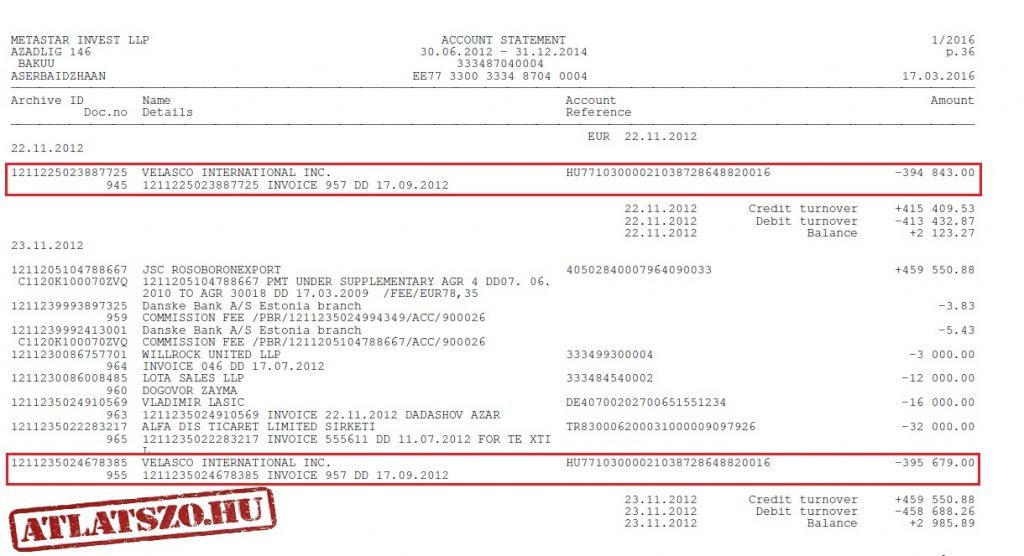The https://english.atlatszo.hu use cookies to track and profile customers such as action tags and pixel tracking on our website to assist our marketing. On our website we use technical, analytical, marketing and preference cookies. These are necessary for our site to work properly and to give us inforamation about how our site is used. See Cookies Policy
Hungarian businessman connected to the Azerbaijani Laundromat makes a fortune in the ventilator business
János Hiszem, a key Hungarian figure connected to the Azerbaijani Laundromat scandal, is one of the big beneficiaries of the epidemic business: his company supplies € 79 million worth of ventilators and other medical equipment under a contract with the Ministry of Foreign Affairs and Trade of Hungary.

The Azerbaijani Laundromat uncovered by the OCCRP was a money-laundering scheme and slush fund used by Azerbaijani elites to disguise the origin of billions of dollars, purchase goods and services, and make secret payments to companies and individuals in the European Union. It was also used to directly enrich powerful, well-connected Azerbaijani politicians.
This is aptly illustrated by the case of Yaqub Eyyubov – one of the country’s most powerful officials – and his family. Atlatszo contributed to the story researching an offshore company’s Hungarian connections, which was owned by the son of Yaqub Eyyubov, and received a series of payments totalling over $9 million to a Hungarian bank account after the Hungarian state extradited Azerbaijani axe murderer Ramil Safarov.
Azerbaijani slush fund transferred millions of dollars to Hungary in 2012
The Azerbaijani Laundromat uncovered by the OCCRP was a money-laundering scheme and slush fund used by Azerbaijani elites to disguise the origin of billions of dollars, purchase goods and services, and make secret payments to companies and individuals in the European Union. It was also used to directly enrich powerful, well-connected Azerbaijani politicians.
In 2017 our research revealed that the offshore shell company Velasco International Inc., registered in the British Virgin Islands, had a representative named János Hiszem in Hungary.
János Hiszem was born in Técső, Transcarpathia, in the then Soviet Union, lived in Moldova for years, but also worked in Baku. He is living in Hungary, in one of the settlements of the Danube Bend, for a long time. According to an 1996 article, Hiszem was the Hungarian representative of Rosenergoatom, a subsidiary of the Russian state-owned company Rosatom through one of his companies.
A recent article by HVG revealed that another company owned by János Hiszem, Pro Concept Tanácsadó Kft., is one of the major beneficiaries of the public procurements announced in connection with the coronavirus epidemic.
Based on a contract signed on 17 June 2020 with the Ministry of Foreign Affairs and Trade of Hungary, the company supplies a total of EUR 79 million, ie HUF 28 billion worth of ventilators and other medical equipment, such as masks, protective clothing and tests.
Pro Concept, which specializes in information technology consulting and employs 3 people, had a turnover of 3.8 billion forints in 2019, which was enough for a profit of 2.9 billion forints, and the sole owner János Hiszem is entitled to a dividend of HUF 1.9 billion.
We have written several articles so far about the oddities surrounding coronavirus defense procurement: that opportunistic traders and slugghis authorities let fake and faulty masks flood Hungary, that PR photos reveal telltale details to identify medical supplies of dubious quality imported by Hungary, and that a Hungarian family played a key role in delivering medical supplies from China.
Raiders and scouts: a Hungarian family played a key role in delivering medical supplies from China
Longtime state interests shaped the Chinese web of connections surrounding a company that won several COVID-related contracts from the Hungarian government, a new investigation by Átlátszó has found. The company in question, CECZ Közép-európai Kft.
Written by Antónia Rádi, click here for the original Hungarian version of this article.

Share:
Your support matters. Your donation helps us to uncover the truth.
- PayPal
- Bank transfer
- Patreon
- Benevity
Support our work with a PayPal donation to the Átlátszónet Foundation! Thank you.
Support our work by bank transfer to the account of the Átlátszónet Foundation. Please add in the comments: “Donation”
Beneficiary: Átlátszónet Alapítvány, bank name and address: Raiffeisen Bank, H-1054 Budapest, Akadémia utca 6.
EUR: IBAN HU36 1201 1265 0142 5189 0040 0002
USD: IBAN HU36 1201 1265 0142 5189 0050 0009
HUF: IBAN HU78 1201 1265 0142 5189 0030 0005
SWIFT: UBRTHUHB
Be a follower on Patreon
Support us on Benevity!

